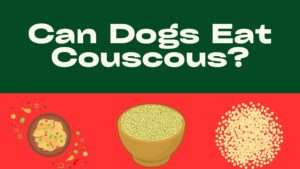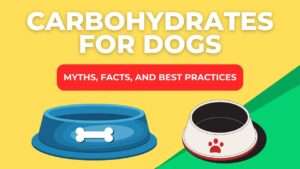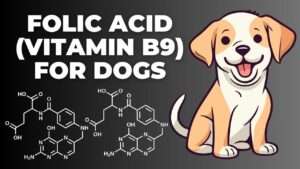Are you a dog owner who loves to bake and occasionally shares snacks with your furry friend?
While poppy seeds may add flavor and texture to your recipes, you might wonder if they’re safe for your canine companion.
Let’s delve into the question: Can dogs eat poppy seeds?
Contents Overview
What is Poppy Seed?
Poppy seeds are tiny, kidney-shaped seeds harvested from the opium poppy plant.
These small but potent seeds are commonly used in cooking and baking for their nutty flavor and crunchy texture.
However, they also contain trace amounts of opium alkaloids, though not in quantities significant enough to cause intoxication.
Poppy seeds are often sprinkled on bread, pastries, and salads, adding both flavor and visual appeal to dishes.
Nutritional Value of Poppy Seeds
Poppy seeds may be small, but they pack a nutritional punch!
They’re rich in essential nutrients like calcium, iron, magnesium, and zinc, which are vital for maintaining bone health, supporting the immune system, and promoting overall well-being.
Additionally, poppy seeds are a good source of dietary fiber and healthy fats, making them a nutritious addition to your diet.
Just a sprinkle of these versatile seeds can elevate the nutritional value of your meals and snacks.
Nutritional Content : 1-Ounce Poppy Seeds
Poppy seeds may be small, but they pack a nutritional punch. Here’s a breakdown of their nutritional composition per 1-ounce (28-gram) serving:
- Calories: Around 160 calories
- Protein: Approximately 6 grams
- Fat: About 10 grams, predominantly healthy unsaturated fats
- Carbohydrates: Roughly 9 grams, including dietary fiber
- Dietary Fiber: Provides about 3-4 grams, aiding digestion and promoting satiety
- Vitamins: Contains small amounts of various vitamins, including vitamin B1 (thiamine), vitamin B6, and vitamin E
- Minerals: Rich in minerals like calcium, iron, magnesium, phosphorus, potassium, zinc, and coppe.
Can Dogs Eat Poppy Seeds safely?
It’s best to avoid feeding poppy seeds to dogs.
While poppy seeds themselves aren’t toxic to dogs, they can sometimes be contaminated with opium alkaloids, which can be harmful to pets.
Even small amounts of these compounds can cause adverse effects in dogs, including lethargy, vomiting, diarrhea, and in severe cases, respiratory depression or coma.
Therefore, it’s safer to err on the side of caution and refrain from giving poppy seeds to your furry friend. Stick to dog-safe treats and snacks to ensure their well-being.
Health Benefits of Poppy Seeds for Dogs
While poppy seeds should be given in moderation, they can offer some potential health benefits for dogs:
- Nutrient Boost
Poppy seeds contain essential nutrients like calcium and iron, which play a vital role in maintaining your dog’s overall health and well-being. - Digestive Health
The fiber content in poppy seeds can aid in digestion and promote gastrointestinal health in dogs. - Anti-Inflammatory Properties
Some studies suggest that compounds found in poppy seeds may possess anti-inflammatory properties, which could benefit dogs with certain inflammatory conditions.
Safe Ways to Feed Poppy Seeds to Dogs
Let’s explore some safe ways to feed poppy seeds to dogs.
Ground or Milled Poppy Seeds
- Grind or mill poppy seeds into a fine powder before adding them to your dog’s food.
- Grinding the seeds helps prevent choking hazards and facilitates digestion.
- Mix the powdered poppy seeds with your dog’s regular food to introduce them gradually into their diet.
Sprinkle Sparingly
- Start with a small amount of powdered poppy seeds, gradually increasing the quantity over time.
- Sprinkle the powdered seeds lightly over your dog’s food to avoid overwhelming their system.
- Monitor your dog for any adverse reactions, such as gastrointestinal upset or allergic symptoms.
Incorporate into Homemade Treats
- Use powdered poppy seeds as an ingredient in homemade dog treats.
- Combine the powdered seeds with other dog-friendly ingredients like oats, peanut butter, or mashed sweet potato to create nutritious treats.
- Bake the treats at home to ensure they’re free from harmful additives or preservatives.
Mix with Yogurt or Peanut Butter
- Mix a small amount of powdered poppy seeds with plain, unsweetened yogurt or natural peanut butter.
- Yogurt provides probiotics that support digestive health, while peanut butter adds flavor and texture.
- Use this mixture as a tasty topping for your dog’s regular food or as a filling for interactive toys.
Consider Commercial Treats
- Look for commercially available dog treats that contain poppy seeds as a safe and convenient option.
- Choose treats from reputable brands that prioritize quality ingredients and undergo rigorous testing for safety.
- Read the ingredient list carefully to ensure there are no harmful additives or excessive amounts of poppy seeds.
Observe for Any Adverse Reactions
- Pay close attention to your dog’s behavior and health after introducing poppy seeds into their diet.
- Watch for signs of gastrointestinal upset, allergic reactions, or any other unusual symptoms.
- If you notice any adverse reactions, discontinue feeding poppy seeds and consult with your veterinarian.
Risks of Feeding Poppy Seeds to Dogs
While poppy seeds themselves are not toxic to dogs, there are several factors to consider before sharing them with your pet:
Risk of Intestinal Blockage
Poppy seeds are small and can easily get lodged in a dog’s digestive tract, causing blockages and other gastrointestinal issues.High-Fat Content
As mentioned earlier, poppy seeds are high in fat, which can contribute to obesity and pancreatitis in dogs if consumed excessively.Choking Hazard
The small size of poppy seeds can pose a choking hazard, particularly for small dogs or those prone to gulping their food without chewing properly.Potential Allergies
Dogs, like humans, can develop allergies to certain foods, including seeds. Allergic reactions may manifest as itching, hives, or gastrointestinal upset.Opium Content
Poppy seeds are derived from the opium poppy plant, which contains trace amounts of opiates. While the levels in the seeds are minimal, consuming large quantities could potentially have adverse effects on a dog’s health.Potential Health Risks
Dogs have different metabolic processes than humans, and certain foods that are safe for us can be harmful to them. Poppy seeds may cause adverse effects in dogs, including:
- Digestive upset
- Nervous system depression
- Respiratory depression
- Allergic reactions
Symptoms of Toxicity - Feeding Poppy Seeds to Dogs
If a dog consumes a large quantity of poppy seeds or exhibits unusual symptoms after ingestion, it’s essential to seek veterinary attention immediately.
Symptoms of toxicity may include:
If your dog accidentally consumes poppy seeds, be vigilant for signs of toxicity, including:
- Lethargy
- Vomiting
- Diarrhea
- Loss of coordination
- Difficulty breathing
- Changes in heart rate
- Seizures
What to Do If Your Dog Ingests Poppy Seeds
If you suspect your dog has eaten poppy seeds or any food containing them, contact your veterinarian immediately. Prompt medical attention is essential to mitigate potential health risks and ensure your dog’s well-being.
Alternatives to Poppy Seeds for Dogs
Instead of sharing poppy seeds with your canine companion, consider offering safe and healthy treats such as:
- Chia Seeds and Flaxseeds:
- Provide omega-3 fatty acids for a healthy coat.
- Aid in digestion with their fiber content.
- Pumpkin Seeds:
- Rich in antioxidants.
- Contains minerals like zinc and magnesium.
- Sunflower Seeds:
- Unsalted and shelled for safety.
- Offers vitamin E and healthy fats.
- Additional Alternatives:
- Plain, unsalted nuts like almonds or cashews (in moderation).
- Fresh fruits like apples, bananas, or blueberries.
- Vegetables like carrots, green beans, or sweet potatoes.
Precautions
To minimize potential risks, pet owners should take the following precautions when considering feeding poppy seeds to their dogs:
- Moderation: Offer poppy seeds in small quantities and observe for any adverse reactions before increasing the amount.
- Avoid Unprocessed Poppy Pods: Whole poppy pods or large quantities of unprocessed seeds pose a higher risk of toxicity and should be avoided.
- Monitor for Symptoms: Keep a close eye on your dog for signs of gastrointestinal upset, allergic reactions, or any unusual behavior after consuming poppy seeds.
- Consult with a Veterinarian: Before introducing poppy seeds or any new food to your dog’s diet, consult with a veterinarian, especially if your pet has underlying health conditions or is on medication.
Bottom Line
While poppy seeds themselves are not toxic to dogs, it’s best to err on the side of caution and avoid giving them to your furry friend.
The risk of intestinal blockage and potential allergic reactions outweigh any potential nutritional benefits.
Instead, opt for safer alternatives and always consult with your veterinarian before introducing new foods into your dog’s diet. Remember, your pet’s health and well-being should always come first.

































+ There are no comments
Add yours